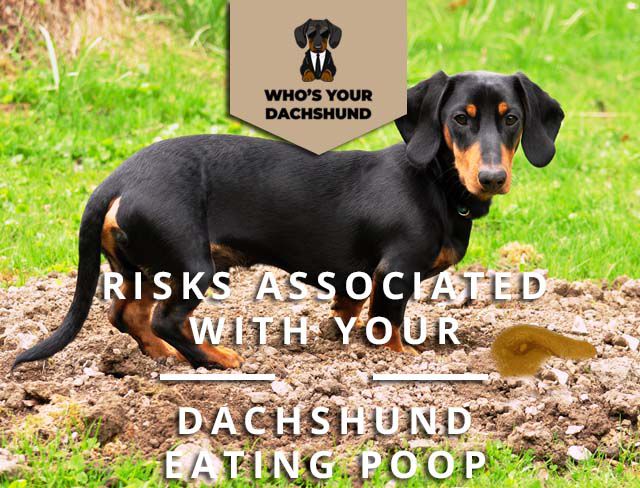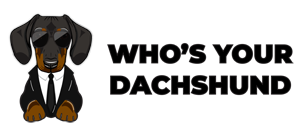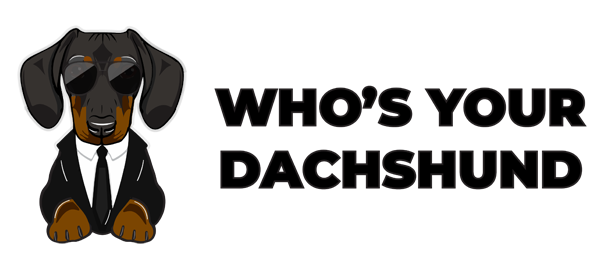
Some risks associated with your Dachshund eating poop include intestinal parasites, resulting in anemia. Other complications that can arise are a variety of stomach and digestive problems.
Intestinal Parasites
Intestinal parasites are among the most common risks associated with your Dachshund eating poop. If your dog eats other dogs’ feces, it can become infected with tapeworms, roundworms, or hookworms. Even worse is that these parasites can transfer to humans who contact them. These infections are easily treatable and preventable with medication prescribed by a veterinarian.
Gastrointestinal Issues
Other complications that can arise from your Dachshund eating poop include:
Bloating
Your Dachshund could get a bloated stomach if they eat poop at once or at times when their stomach is full already. Your Dachshund may need to go poop more often, especially if they eat poop at once and expand their stomach.
Abdominal pain
Your Dachshund could get abdominal pain from eating poop with many bacteria. If you notice your Dachshund getting abdominal pain after they overeat poop, you’ll want to consult with your veterinarian.
Constipation
Your Dachshund can develop constipation if they eat poop or the poo has too many pathogens in it. You’ll need to ask your veterinarian to determine how to get rid of constipation in your pup.
Risk of Internal Organ Damage
If your Dachshund eats poop with embedded plastic or other types of materials in it like glass, your puppy could develop internal organ damage. The risk of this happening increases if your dog is an older pup. The recommended method for preventing these risks is to make sure your Dachshund is not eating poop. You can do that with a dog poop scooper and eco-friendly pet waste bags.
Risk of Disease Transmission
Finally, having your dog eat poop can also make them more susceptible to other diseases like kidney disease, diabetes, and cancer.
These are risks associated with your Dachshund eating poop, but there are ways to prevent these dangers by simply not allowing your pup to eat poop.
Eating poop is a learned behavior, and they will get the hang of it eventually. My Dachshund has been eating feces since he was a puppy, so I don’t have any problems with that, but some people might want to avoid this habit altogether if they think it will come back later in life and cause health problems down the line.
Why Do Dachshunds Eat Poop
Dachshunds will eat the poop of another animal to get nutrients and calories. That’s because they have a long, tubular digestive tract, and their diet is primarily carnivorous. Dachshunds may also eat their poop to induce hunger and get extra nutrients.
Understanding Why Your Dachshund Eats Feces
Dachshunds are hunters to a certain degree, meaning that they instinct to chase animals when they sense them. There are also examples of Dachshunds eating poop at the same time that they feed on their prey. It is possible because Dachshund food is usually very high in protein and fat, and the bacteria present in poop help digest those nutrients better than other foods.
Dogs have a highly developed sense of smell, so Dachshunds know when there is an excellent supply of small game or any other type of prey around. They will also consume the poops of other animals to obtain nutrients not readily available from their food at home. If you have a yard with grass, the chances are good that there is more nourishment to be found outside than inside your house.
Dachshunds can be very stubborn, and having them eat poop can be one of their most endearing traits. They are also brilliant little dogs, and they know how to manipulate you into doing what they want, like feeding them or letting them out of the house. Feeding a dog too much will cause them to get fat, and eating other animals’ feces can go hand in hand with this kind of behavior since it’s one way for them to get more nutrients.
Dachshunds also tend to hide their feces because they don’t want you to find out that they ate it. Thus, there’s a chance that your Dachshund eats poop because you punish them for what they do in the house.
What Can I Do to Stop my Dachshund From Eating Poop?
If you have a Dachshund that eats feces, there are several things that you can do to help prevent it.
Step 1
The easiest thing you can do to prevent your Dachshund from eating feces is to make sure they have a constant supply of high-quality food. It would help if you also had them with you when you are preparing the food, which will help them associate the smell of their food with that activity.
Step 2
The next thing that you can do to prevent this habit from developing is keeping your dog confined in a secure area whenever you’re not around to supervise them for at least the first few weeks of their life. It means that you should not allow your puppy outside without being watched by someone else or in your care.
Step 3
If you have a puppy, you should make sure that they are toilet trained and understand what “leave it” means before your Dachshund is brought home. You can also teach it to “drop it” upon command, which will help it understand that “leave it” means poop as well.
Step 4
Using poop scoopers and bags for their waste will make cleaning up after your Dachshund much easier. It will also reduce the number of feces left in your yard or your trash cans, and you should be able to reduce the amount of damage done by flies.
Step 5
You can also teach your Dachshund to use a litter box, but you should make sure that the litter box area is kept clean and it’s away from where they can dig up the soil in your yard. If you don’t want to use a litter box if there are many flies when your puppy needs to go for a bathroom break, you can buy some flypaper and place it around the area they are using.
Step 6
You can also avoid letting your dog out of their yard if there is potential fecal matter present in that area, especially if it’s near where another dog has been pooping.
Your Dachshund should stop eating feces after they are about two months old. You should keep tabs on your puppy and make sure that they have a healthy diet and plenty of exercise.
If your Dachshund is still eating feces when they are three months old, you may want to have them checked by a veterinarian.
Another way of preventing this habit is to feed them before their last meal, so they defecate before you sleep. Then, you can clean it up before bedtime or in the morning, which should help prevent this habit from starting again.
Facts About Dogs Who Eat Poop
Ever wonder why your dog eats poop? Chances are, they’re just trying to get their nutrients. The article “Facts About Dogs Who Eat Poop” investigates this phenomenon and how it can be detrimental to your dog’s health. When your dog eats feces, they are ingesting parasites and bacteria that can harm their health. There has been speculation that feces consumption is more common in dogs than in other animals. That may be because dogs have evolved from wolves who were hunters and scavengers, so they naturally will have some of these tendencies encoded within them. If you are wondering why does my dog eat poop, there are a few reasons as to why this behavior manifests itself:
Factors That Can Influence Dogs That Eat Poop
If your dog consumes poop, there’s a good chance that it’s because they lack some essential nutrients in their diet. Healthy pets require a balanced consumption of the right kinds of foods to maintain good health. The following factors can affect your dog’s tendency to eat poop:
Whether you realize it or not, your dog’s diet can have a massive impact on their propensity to eat feces. When you consider that dogs are carnivores, it shouldn’t be surprising that they need meat in their diet. However, many commercial foods contain by-products and other additives that can throw off dogs’ nutritional balance. It is especially true with grain-based kibble diets that are the most common kind of dog food out there today.
When your dog is digesting food, the pancreas releases enzymes that help break down the stomach’s food into tiny particles.
Eventually, these tiny particles break down even more in the small intestine and meet up with other nutrients and minerals to be absorbed into your dog’s bloodstream.
But when dogs eat grain-based kibble, their body treats those particles as they would a stone or a chunk of wood. And so rather than breaking them up, this causes blockages that are just like fecal impaction – with one big difference: you can’t remove them with an enema or by bloating him up and then cutting him open.
The likely result is “poop” instead of nutrition. And it can make your dog sick but not always in a way you can see.
The truth is that some dogs have a genetic tendency to develop a condition called pancreatic insufficiency, which prevents them from being able to break down food properly.
And this can cause digestive problems resulting in heart disease, diabetes, and obesity. That is not a good combination for your dog’s health, so you need to take steps to prevent it from happening by feeding your dog something it can digest well and ensuring that it has regular cleanings of its teeth and fur.
16 Reasons Dogs Eat Poop and What To Do About It
1. The dog was standing near a pile of poop and ate some by accident.
It is among the most common reasons why dogs eat poop. Dogs are known for eating feces from other animals or their vomit if they have the opportunity to do so. That’s because dogs are scavengers as well as carnivores. Even though we humans provide them with food, there’s no guarantee that what we give them is complete and balanced, so they will instinctively look elsewhere for nutrition when given a chance.
2. The dog was fed poop on purpose by humans or other animals.
In these instances, the parents may be trying to teach their young pups how to behave while living in nature with other wild animals that eat feces regularly for nutrients.
3. The dog is trying to find leftover food not intentionally fed to the dog by a human.
4. The dog has gone hungry and is hungry enough for the poop to taste delicious.
5. Sometimes, the dog does not like the smell of feces and eats it anyway because they’re in a hurry or cannot wait until they get home.
6. When owners are gone, their dogs eat their poop because when left alone, their poops may attract other animals exposed to the odors and come looking for it too; however, this does not happen all of the time.
7. Dogs do not like the pungent odors of feces.
8. Sometimes, they are just bored and can’t find something to do and end up eating their poop, whether a human or an animal leaves it behind, but it is still considered littering.
9. If the dog has something wrong with his stomach or intestines, there are times when he will not be able to digest food properly. He will eat his poop by mistake instead because it is digested easily; however, if this happens, you need to take your puppy to a veterinarian right away. Otherwise, he could become severely sick.
10. Dogs can get minor gastrointestinal diseases that can make them want to eat their stool.
11. They may develop a psychological problem and eat feces because they like the taste or just how it feels in their mouth. It is called coprophagia and is a principal reason why dogs eat poop.
12. If dogs have worms, it makes it easy for them to get into the dog’s stomach and cause all sorts of digestive problems, including coprophagia, so you must take your dog to the vet immediately if this happens to avoid worse things from happening.
13. Puppies can eat poop because they are curious, and you may have noticed that one of the many things your puppy likes to chew on is his bowel movements.
14. Puppies also eat poop because they are teething, and it gives them something to keep their mouth busy.
15. If a dog does not poop regularly, he may swallow it by accident and think it will go away. In this case, you should see your veterinarian first, even if you give him a laxative.
16. Dogs that live in the city are usually more promiscuous and may eat human feces from car parks or park bins, especially when there is too much litter there.
Is Your Dog Eating Poop? It’s Called Coprophagia
Coprophagia is an eating disorder in which an animal consumes the poops of another animal. Coprophagia is a pervasive behavior, especially among puppies weaned from their mother’s milk. But there are also adult dogs that engage in this kind of behavior. Although coprophagia is common, there are ways to discourage it.
- Some dogs eat poop out of hunger, which implies they are not eating a balanced diet that sustains them. If a dog has been eating poop regularly and hasn’t started vomiting, the dog probably isn’t malnourished or sick. To remedy this situation, you must take the time to feed your dog correctly and give it attention when you come home from work.
- A behavior issue is another common cause of coprophagia in dogs. Coprophagia can be a symptom of obsessive-compulsive disorder, and it may also be a part of various forms of anxiety. If you have taken the time to train your dog correctly, then it’s likely that he will stop eating poop if you make sure that you call him when you are going to leave for work or go on holiday so that he can know that the door is closed and that no one else has been there since the last time he ate poop.
- Some dogs eat poop because they like how it smells. It would help if you found out the cause of this liking as soon as possible to treat the root of the problem.
- Some dogs eat poop because they get bored and because they’re tired; they begin to search for something to do, which makes them curious about what their owner has left behind.
- Some dogs hold a grudge and have been taught to leave spit in tiny little plastic bags whenever someone leaves a pile of poop lying around.
Foods You Should Give To Your Dachshund To Avoid Eating Poop
- Dry dog food
Some dogs are very picky eaters, and if there is even the slightest smell of feces on the dry dog food that they are eating, they will avoid it no matter what. If your dog is not eating anything else and is concerned that he is eating poop, you can give him some of this dry dog food.
- Raw vegetables
Raw vegetables such as carrots, parsley, or celery can help keep your dog from wanting to eat feces because it can give him an appetite. However, it would be best if you never gave your dog green beans because they can cause intestinal obstruction.
- Herbs and spices
Herbs and spices are great for dogs with a preference for eating poop because they will become so used to their taste that they will appear to resist eating poop. Herbs and spices contain fragrant oils that keep your dog from wanting to eat poop in the first place.
- Garlic
Garlic not only helps your dog’s immune system but also helps train his tastebuds to avoid any foods that contain the tastes of feces.
- Green beans
Green beans are thought to help with constipation. However, if you give green beans to your dog, it must have enough water because the beans may cause an intestinal obstruction. It would help if you also waited a few hours before giving it any more food so that the green beans can pass through its system.
- Apple cider vinegar
Apple cider vinegar is suitable for dogs with stomach and digestive problems. It helps their digestion and cleans their bowel movements since it contains beneficial probiotics. If your dog eats poop regularly, then you can give him some apple cider vinegar along with some plain water every day.
- Spinach
Spinach is an important source of various minerals and vitamins such as iron, folic acid, calcium, vitamin A, manganese, and zinc. Spinach also contains omega-3 fatty acids that are great for your dog’s skin and coat. Spinach leaves will reduce your dog’s appetite for poop because the smell of them is so strong that it will make him want to avoid eating them entirely.
- Eggs
Eggs are a complete food for dogs, and you should never give your dog large amounts but relatively small amounts twice a week because they contain a lot of protein. Some dogs even love the taste of eggs.
- Plain yogurt
The bacteria in plain yogurt can help eliminate your dog’s loose bowel movements and his bad breath, which means that he will not be tempted to eat feces at all because it doesn’t smell good. Instead of chocolate or other sugary snacks, give your dog yogurt as a treat.

